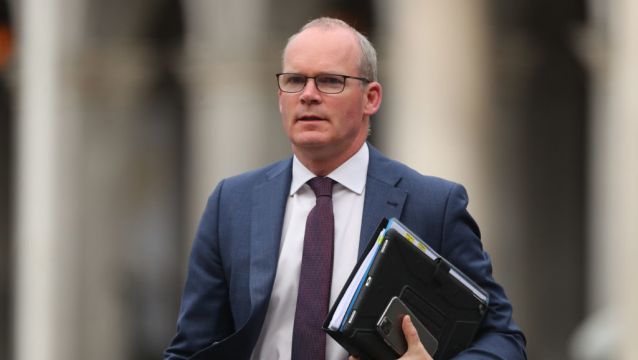Updated: 11.30am
Minister for Foreign Affairs Simon Coveney has said that the Russian ambassador to Ireland either did not know what was going to happen in Ukraine, or he deliberately misled the Irish public, an Oireachtas Committee and the Minister as well.
It had become clear in recent days that the Russians had been planning the attack on Ukraine for many months, Mr Coveney told Newstalk Breakfast. The ambassador was “part of that system” and people could make their own judgement.
In the meantime the advice to the estimated 70 to 90 Irish citizens still in Ukraine was to get out if it was safe and to do so through a neighbouring country, if it was not safe to move then they should stay “in situ”.
The Irish Government had a responsibility also to the babies born to Irish parents through surrogacy, he added. That was why lines of communication with Moscow must remain open, he explained.
Later on RTÉ radio’s Morning Ireland Mr Coveney said that no country in the EU was looking to expel ambassadors.
The EU would act together to look at options that would send “a clear diplomatic signal” to Moscow. The expulsion of staff (from the embassy) would send a strong signal and Russia would probably respond in the same way, he warned.
Lethal weapons
Mr Coveney also explained Ireland’s decision to “constructively abstain” from contributing to an EU package to provide nearly half a billion Euro of funding for lethal equipment in Ukraine.
He said that when the peace facility was agreed in the EU last year a compromise was made for countries not comfortable with the funding of lethal weapons. Instead, Ireland will contribute €9 million to the non-lethal EU fund which will include helmets, medical equipment, kits.
The EU was right to intervene in this way, he said. If the EU did not Ukraine then their moral substance would be questioned.
In the past 24 hours 77,000 people from Ukraine had crossed the border into Poland, 25,000 into the Czech Republic, 90,000 into Romania and 60,000 into Hungary, said Mr Coveney.
The UN was estimating that 18 million Ukrainians could be in need of assistance, four million would be refugees and seven million would be displaced in their own country. “This is the scale of conflict.”
The EU response was one that had never been seen before.
Mr Coveney said that his job was to protect Irish citizens and to do that he had to keep the lines of communication open even if he fundamentally disagreed with the people with whom he was communicating.
It would not be wise to expel the ambassador and not have a direct line to Moscow, he said, but added that he understood the sentiment when there were calls for the expulsion of the ambassador.
Assistance
Later, former army ranger Independent TD Cathal Berry has said the Government could send ammunition to Ukraine “in a matter of hours” and it would not contravene the Programme for Government.
The only way to end the conflict in Ukraine was to defeat the Russian army, he told RTÉ Radio’s Today with Claire Byrne show.
Mr Berry said that as a former member of the defence forces, he was aware there were anti-aircraft missiles and anti-armour rockets stored which could be transported quickly to Ukraine.
The Programme for Government was explicit about EU peacekeeping money for non-lethal weapons, but this did not preclude “alternative pathways” to providing arms to Ukraine, he said.
Mr Berry added that the Russian regime was “deceptive, devious and duplicitous”. They would not listen to “soft power”, he said, stating they only believe in “hard power”.
The talks today had nothing to do with peace, he added, predicting Russia is going to tell Ukraine: “If you don’t surrender, we will level Kyiv”.
Mr Berry also warned there was no guarantee that Russian tanks would stop at the Polish border and “next week” they could target Baltic countries.







